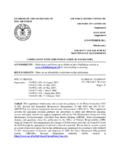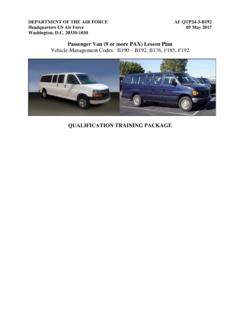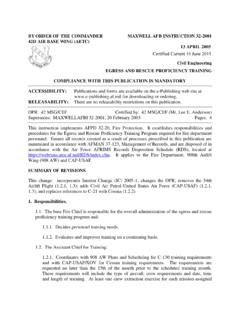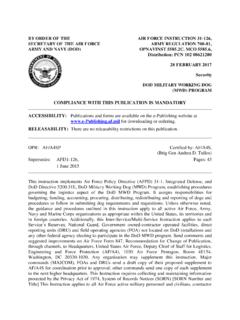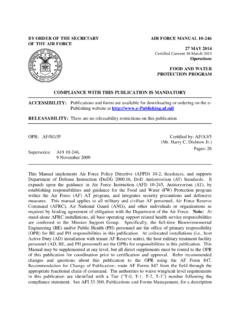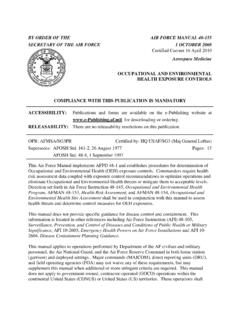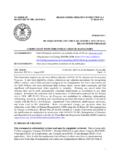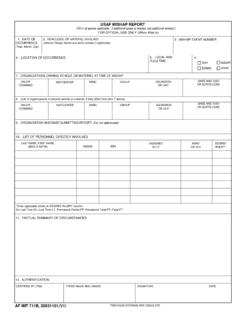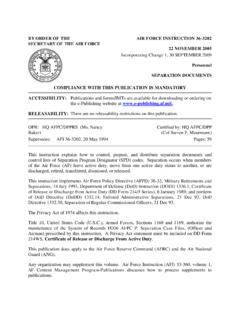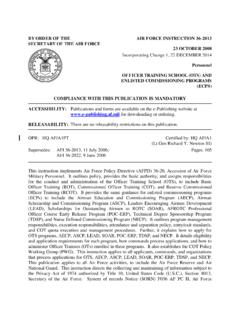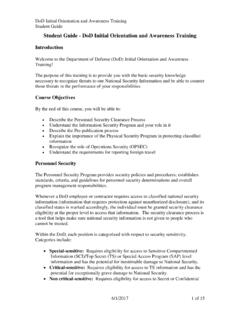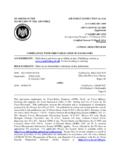Transcription of AFI10-2501 AFGM2017-02 1260 Air Force Pentagon …
1 department OF THE AIR Force washington DC AFI10-2501_AFGM2017-02 2 August 2017 MEMORANDUM FOR DISTRIBUTION C MAJCOMs/FOAs/DRUs FROM: HQ USAF/A4 1260 Air Force Pentagon washington DC 20030-1260 SUBJECT: Air Force Guidance Memorandum to AFI 10-2501, Air Force Emergency Management Program By Order of the Secretary of the Air Force , this Air Force Guidance Memorandum immediately changes AFI 10-2501, Air Force Emergency Management Program. Compliance with this Memorandum is mandatory. To the extent its directions are inconsistent with other Air Force publications, the information herein prevails, in accordance with AFI 33-360, Publications and Forms Management. Air Force guidance for emergency management C-Bag authorizations and education and training courses provided in AFI 10-2501, Dated 19 April 2016, require immediate revision. This AFGM implements changes to Air Force policy for Section CBRN C-Bag authorizations (attach 1) and courses CBRN Defense Orientation, CBRN Defense Awareness (ZZ133039), and CBRND efense Survival Skills (ZZ133041) (attach 2).
2 In addition, it removes Table CBRN Threat Area Designation and associated references and clarifies that CBRN threat designations are determined by Combatant Command-developed intelligence estimates. This Memorandum becomes void after one year has elapsed from the date of this Memorandum, or upon incorporation by interim change to, or rewrite of AFI 10-2501, whichever is earlier. JOHN B. COOPER Lieutenant General, USAF DCS/Logistics, Engineering & Force Protection 3 Attachments: 1. Attachment 1 AFI 10-2501, Table Replacement2. Attachment 2 AFI 10-2501, CBRN C-Bag Authorizations Replacement3. Attachment 3 AFI 10-2501, Attachment 3 ReplacementAttachment 1 AFI 10-2501, Table Replacement * Table Summary of Available AF EM Education and Training Courses. Course Title Delivery Format Prerequisite Recurring Supporting Paragraph Online Instructor Other Yes No Yes No Base Emergency Preparedness Orientation (BEPO) In-person during new- comer s orientation X X AF EM Program: Senior Leader Immersion X X X Unit EM Representative X X X X Air Force Emergency Response Operations (AERO).
3 First and Emergency X X X X Incident Command System (ICS) 300/400 X X X EOC Operations X X X X EOC Director X X X Control Center Operations X X X X X RTF X X X X SMT X X X X X CCT X X X X X CCA X X X X CCS X X X X Post Attack/ X X X X Course Title Delivery Format Prerequisite Recurring Supporting Paragraph Online Instructor Other Yes No Yes No Incident Reconnaissance (PAR) EMST X X X CBRN Defense Accession course X X X CBRN Defense Awareness X X X CBRN Defense Survival Skills X X X X WERC X X X Attachment 2 AFI 10-2501, CBRN C-Bag Authorizations Replacement CBRN C-Bag Authorizations. LRS will determine C-Bag authorizations and update MICAS by 1 December each year. (T-2). Follow guidance in AFI 10-403, Chapter 2, and AFI 23-101. (T-2). For installations in MTA/HTA, authorizations include military base populace, emergency essential civilians and contractors, and host nation personnel identified for AF support in host nation agreements.
4 C-Bags may be prepositioned for central issue to personnel for Air and Space Expeditionary Force (AEF) deployments to MTAs or HTAs. C-Bag guidance for these personnel will be included within AOR reporting instructions. Air components and MAJCOMs will determine if personnel assigned TDY to a MTA or HTA during peacetime will be required to bring a complete operational C- Bag and related field gear, including helmet and body armor. Personnel participating in MTA or HTA operational readiness exercises or inspections will bring training IPE components and a protective mask. (T-2). Table DELETED Threat tables designating MTA/HTAs will no longer be included in this publication. Combatant Command-developed J2 intelligence estimates include CBRN threat assessment data and are provided by MAJCOMs to installations in support of operational planning and requirements development. Attachment 3 TRAINING PROGRAMS Attachment 3 AFI 10-2501, Attachment 3 Replacement * Base Emergency Preparedness Orientation (BEPO).
5 Installation Commanders must provide emergency preparedness information to all assigned personnel, including family members, upon initial indoctrination and on an annual basis or more frequently, as the local threat situation dictates. Educational topics include basic preparedness measures, natural, man-made, and technological disasters, and the types of actions to consider before, during, and after the disaster. (T-0). * DELETED * This information will no longer be provided through a stand-alone training course. Instead, this information will be provided to Airmen during Newcomer s Orientation. * DELETED Air Force Emergency Management Program: Senior Leader Immersion. This instructor-led immersion educates and equips installation senior leaders with the guidance and tools necessary to effectively implement the installation s EM Program at their level. This includes how the AF EM Program is organized and implemented on the installation as well as local polices, structure, and responsibilities IAW MAJCOM and local EM Program directives such as the installation s IEMP 10-2 and other plans or requirements.
6 There are no prerequisites identified for this course; however, familiarization with the Air Force Emergency Management Program; Senior Leader Guide is highly recommended prior to immersion. This immersion is designed for newly assigned senior leaders to include the command staff, unit commanders, and key agencies. Senior leaders must complete the immersion within 60 days (or four UTAs for ARC members) of arrival. (T-3). This immersion is only required upon initial arrival to an installation. Recurring education is not required while assigned to the same installation unless the senior leader s roles and responsibilities change or major program changes occur. Only provide a new immersion briefing as needed based on senior leader transition. Air Force Emergency Management Program (ZZ133131). This on-line course consists of individual knowledge-based objectives that provide students the ability to identify the program s purpose, policies, and structure along with the AFIMS.
7 This course serves as the foundation for follow-on specialized area training. There are no prerequisites or instructor-led components identified for this course. Individuals assigned to the installation s DRF or other supporting positions within the installation s EM Program are required to complete this course. (T-3). This course is a one-time requirement upon initial position assignment and no recurring training is required unless major program changes occur. (T-3). This course meets the requirements of FEMA s independent study (IS) courses, IS- 100 and IS-700, while ensuring military unique C2 requirements remain sound to execute critical mission operations. Unit Emergency Management Representative (ZZ133062). This two-part course consists of individual knowledge-based and localized objectives that provide students the knowledge and skills necessary to manage their unit EM Program. It emphasizes unit EM representative roles and responsibilities, unit education and training to include the installation s Be Ready awareness campaign, equipment requirements, planning responsibilities, and emergency response at the unit level.
8 The AF EM Program Course is a prerequisite for this course. This course must be completed within 60 days (or four UTAs for ARC members) of initial assignment as a primary or alternate unit EM representative. (T-3) The two-part course is a one-time requirement upon initial position assignment. Re-accomplish the instructor-led component only if the student is appointed as unit EM representative at a new installation. Accomplish recurring training by attending at least one annual unit EM representative meeting held by the installation s Office of Emergency Management. This meeting is in addition to established program review requirements. Document and maintain attendance using localized procedures. (T-3). Air Force Emergency Response Operations (AERO): First and Emergency Responders (ZZ133130). This on-line course consists of individual knowledge-based objectives that provide students the ability to identify the purpose, policies, structure, roles, responsibilities, and procedures for conducting AF emergency response operations.
9 The AF EM Program Course is a prerequisite for this course. This course must be completed within 60 days (or four UTAs for ARC members) of initial assignment as an incident commander, or by those individuals fulfilling the role of a first or emergency responder. (T-3) The on-line course is a one-time requirement upon initial assignment. Students who have already completed either AERO Introduction or AERO Command and Control are not required to complete this new course or its prerequisite. Accomplish recurring training through performing first or emergency response duties during an exercise or actual emergency response annually. Documenting participation is accomplished and maintained using localized procedures. Additional localized/performance-based training will be provided by the individual s assigned unit as part of unit/functional area training/qualifying. (T-3). Responders are required to accomplish and maintain HAZMAT training IAW 29 CFR to the appropriate level based on the duties and functions as outlined in their CFETP.
10 Contact the installation s FES Flight for HAZMAT training information as applicable. (T-0). This course meets the requirements of FEMA s IS courses IS-200 and IS-800 while ensuring military-unique C2 requirements remain sound to execute critical mission operations. Incident Command System (ICS) 300/400. This instructor-led course consists of individual knowledge-based and performance-based objectives to provide students the knowledge and skills necessary to assume supervisory roles in expanding incidents where multiple functions and agency resources are needed to ensure life safety, incident stabilization, and property preservation (ICS 300) and perform in a management capacity within a Multi- Agency Coordination System (ICS 400). The AF EM Program Course and the AERO: First and Emergency Responders Course are prerequisites. ICS 300/400 courses are available in the following three options: An in-residence AF formal training course (X3 AZR3 EXXX 0N1A) conducted at the DOD Fire Academy.
